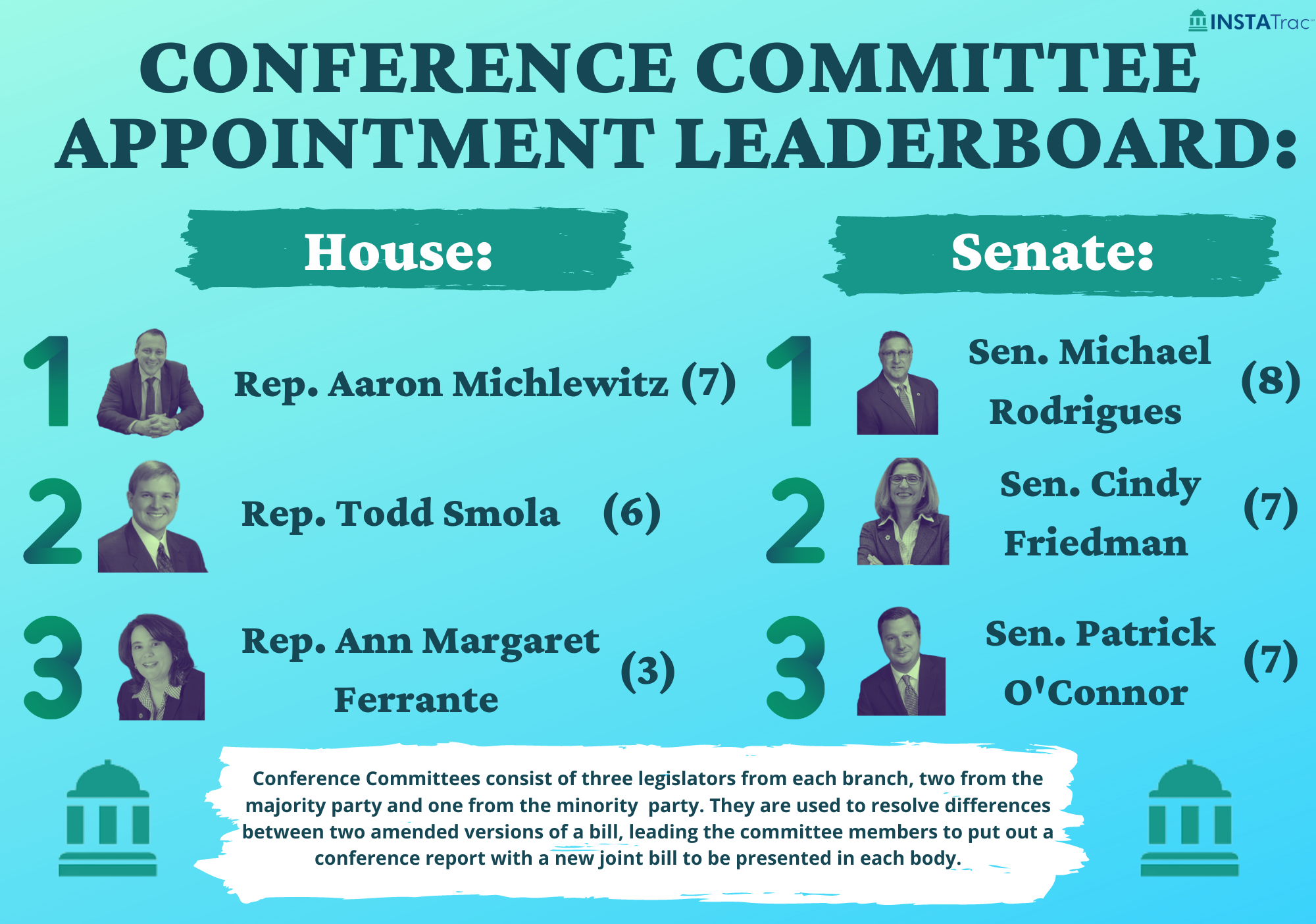
Continued Use of Conference Committees
There are many aspects of Massachusetts state government that allow the legislative process to work both efficiently and effectively. While most steps of the legislative process are known to the public, a bill does not become law simply. For the most divisive and complex legislation, a conference committee will be used to iron out legislative differences between chambers. As such, the conference committee stage of the legislative process is crucial, as it requires collaboration across parties and chambers in order to produce a consensus bill that will be able to reach the Governor’s desk. Our analysis of conference committees from the 2021-2022 legislative session reveals some interesting trends in regard to their usage, as well as the unbalanced appointment process of legislators.

Incumbents: In or Out? Governor’s Council Races 2022
As a part of our ongoing series of blog posts over the past month, we have highlighted a number of candidates running for various positions in Massachusetts. While Bay Staters will have a number of important decisions to make on Election Day, there is one office that due to high incumbency rates often receives far less media attention than others. In spite of a smaller media spotlight, Governor’s Council positions are some of the most important on the ballot. The decisions of the Governor’s Council greatly impact the legal and political landscape of the Commonwealth. Not only do these officials advise the governor, but they approve or deny state treasury requests, pardons, and all gubernatorial appointments, including the positions of judges. In the wake of Roe v. Wade being overturned, focus on the courts, even on the local level, has been heightened. In order to help voters make the most educated decision at the polls, here is our analysis of just some of the eight Governor’s Council positions on the ballot this fall.

Open Seat Elections 2022: MA House of Representatives
In our previous post, we highlighted the five elections for fall 2022 in the Massachusetts state senate in which an incumbent is not running for their current position. These “open seat” elections often present the most unpredictable results, especially when considering that certain legislative districts have been redrawn for the 2022 election. While each of the five senate elections could be impacted by these changes, this will have a much larger effect for the open seat elections in the House. Not only do senators represent a larger voting base than representatives, but there are also a whopping 20 open seats in the House, a total of 13% of all those in the legislature for 2022. Taking all this into account, these elections will be very important in determining the future of the legislature, which is why we have provided a detailed analysis of some of the most heated races this fall.

Open Seat Elections 2022: MA Senate
The fall of 2022 will have a number of important elections taking place in the Commonwealth. This includes a number of elections for federal, state, and local positions, all of which will greatly impact the future for Massachusetts. While we have previously highlighted data on the many current legislators running for non-legislative state positions, their candidacy in these races has left a vacant seat for their present roles. There are a number of open seat elections in each branch of the legislature, but for this week, we took a deep dive into the five open seats in the state senate. From Boston to Worcester, some of the Commonwealth’s most populated areas have important decisions to make in these races, so here is a breakdown of each based on the information we’ve collected

Less Love for Legislators - MA Democratic Party Convention 2022
This past weekend on June 3-4, the Massachusetts Democratic Party held a convention in Worcester in order to help establish the party’s endorsements for the 2022 state election. In each election, approximately 4,000 votes were cast by delegates, and the results were interesting, to say the least. While there are a number of trends worth noting from the results, one of the most notable is that no current legislators received a majority percentage of delegate votes. In our analysis of each race, we detail why this was the case and how legislative data may lead to a different result in the actual party primary.
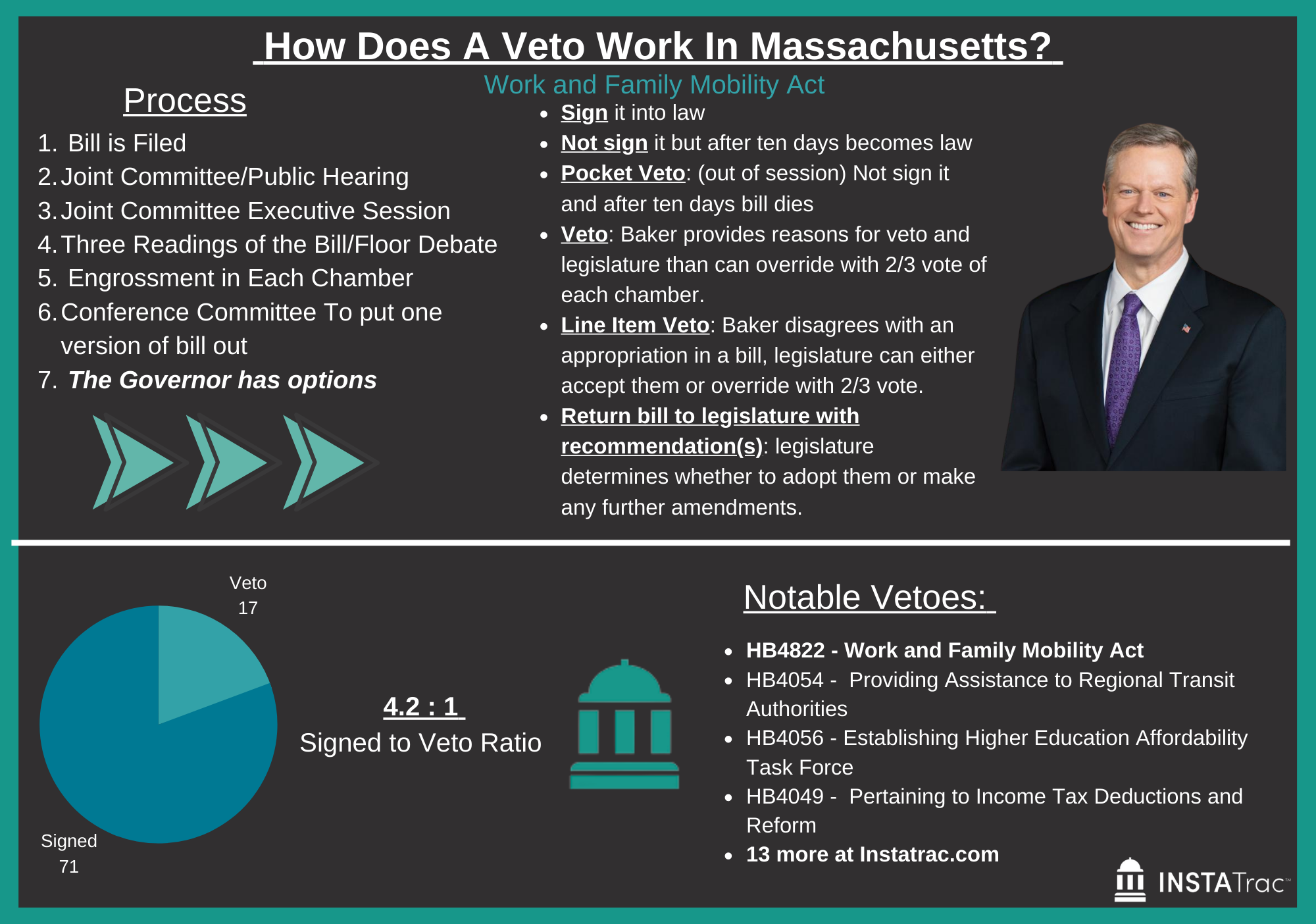
The Power of Veto
Across most levels of government in the U.S., the executive branch holds significant powers that do not exist in other branches. This rings true in Massachusetts, where the governor has a number of privileges, one of the most known being the power of veto. Though many may already be aware that a veto is an executive’s power to reject a bill and send it back to the legislature, very few citizens understand the different types and frequency of vetoes in Massachusetts. In looking at Governor Baker’s actions of the past session, certain trends in his use of vetoes are apparent.
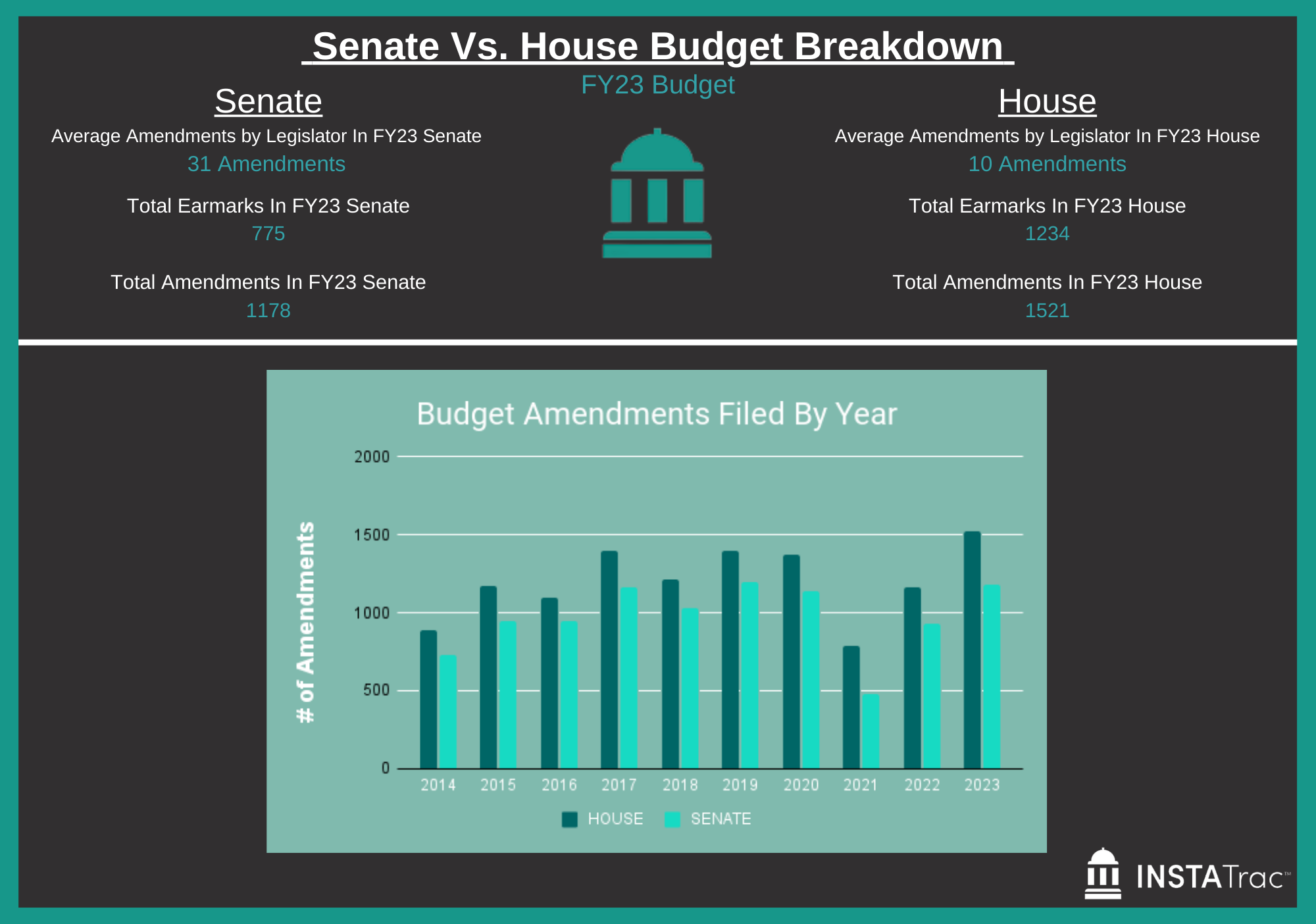
House v. Senate: The Better Budget Proposal:
Over the past month and a half in Massachusetts, the primary focus for the state legislature has been to draft and pass a proposal for the FY23 budget. This year’s budget process has invoked intense debate in both the House and Senate, with deliberations likely concluding in the Senate today. While each proposed FY23 budget allocates practically the same allotment of around $49.6 B, the budgets themselves differ in a number of ways. Looking at our data from this year as well as the past decade, an analysis of each budget reveals frequent differences that have occurred between House and Senate proposals.
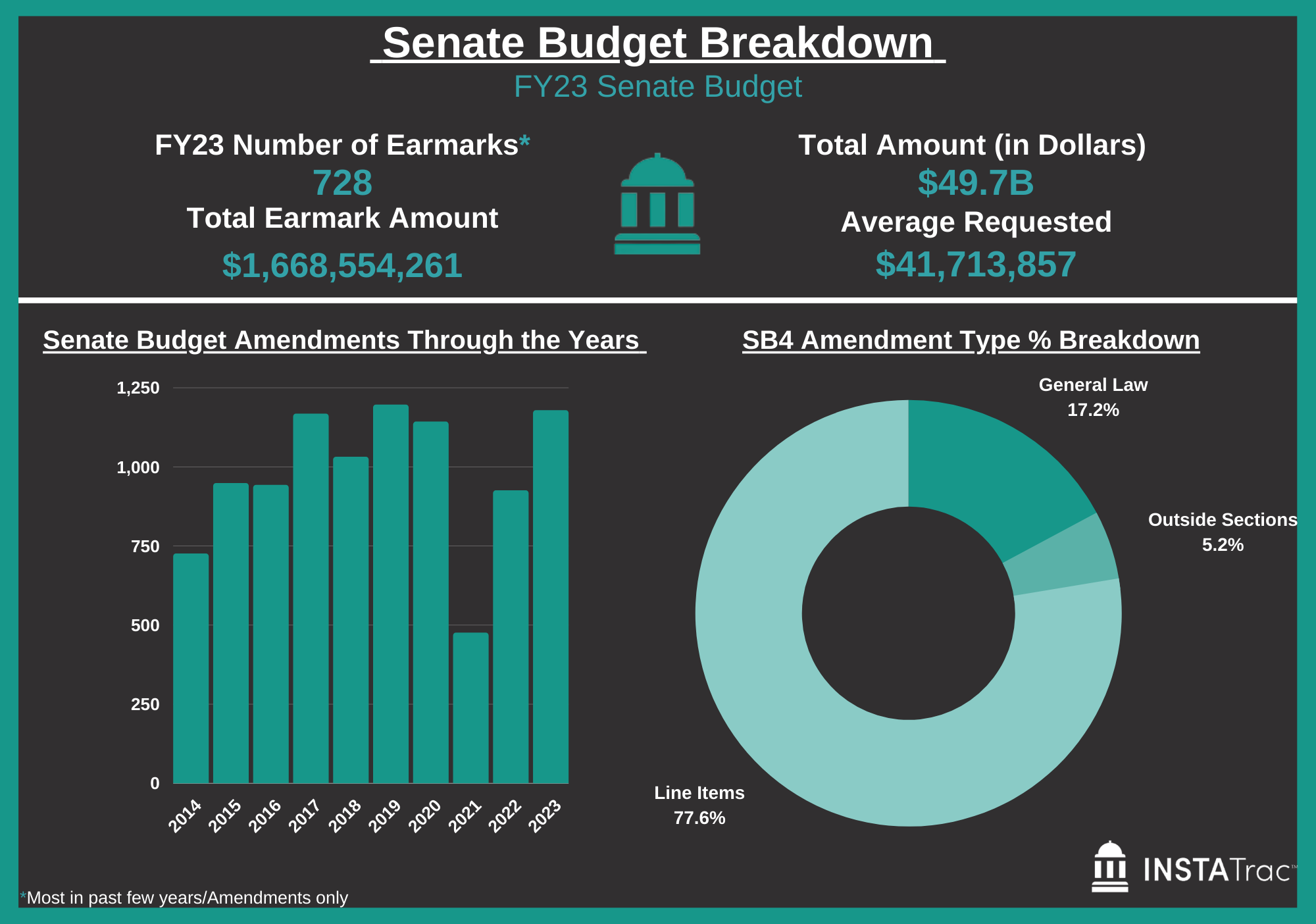
Senate Budget Breakdown - A Decade of Change:
Last Friday at 1:00 PM, the Massachusetts State Senate released 1,178 amendments to their proposed fiscal year 2023 budget, SB4. The budget, which appropriates $49.7B total, funds many initiatives also included in the recent House budget (HB4700), including early education, mental health services, and more. However, SB4 differs in some ways to that of the House’s proposal, as well as in comparison to Senate budgets from previous years. Our detailed look into the past decade of Senate budget proposals reveals some interesting trends in the legislature, and how future budgets may be impacted.

Alito Opinion Aftermath: Abortion Rights Won’t Change in Massachusetts
This past week, much of the nation was shocked when a leaked Supreme Court majority opinion from Justice Samuel Alito showed intent to reverse the decision from Roe v. Wade in 1973. As many know, the Roe v. Wade decision helped make first and second trimester abortions legal across the U.S., but in the wake of its undoing, the legality of abortion will be left up to the states. In Massachusetts, abortion is already a codified state right, thanks to the ROE Act passed in 2020. This and other ongoing legislative efforts exemplify how Massachusetts prioritizes abortion access, but as our data reveals, the state still can be impacted by the Alito opinion.
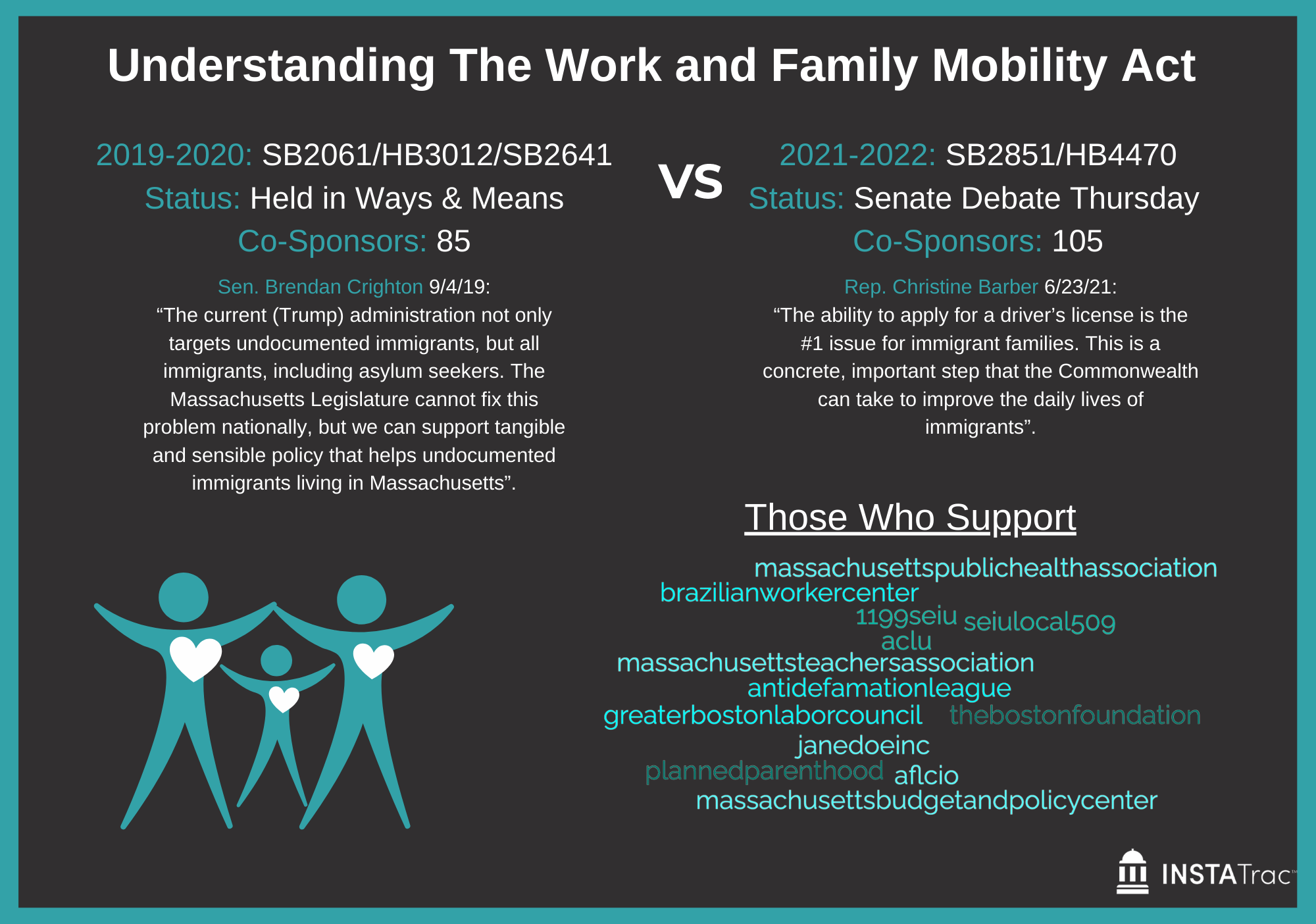
An Overview: The Work and Family Mobility Act
Starting at 11:00 AM today, the Massachusetts State Senate will be debating an important bill for thousands in the Commonwealth, the Work and Family Mobility Act, SB2851. The bill, previously passed in the House (as HB4470) will allow for undocumented immigrants living in Massachusetts with a Real ID (valid or expired) to apply for a driver’s license in Massachusetts. While the license would still differ from a typical driver’s license and primarily provide certain protections for undocumented immigrants in the state, the legislation is a hot button issue. Many Democrats favor the bill’s passage, while many Republicans in Massachusetts are vehemently opposed. Our legislative data helps detail the journey of the Work and Family Mobility Act to this point, and forecasts how it could change through today’s Senate debate.
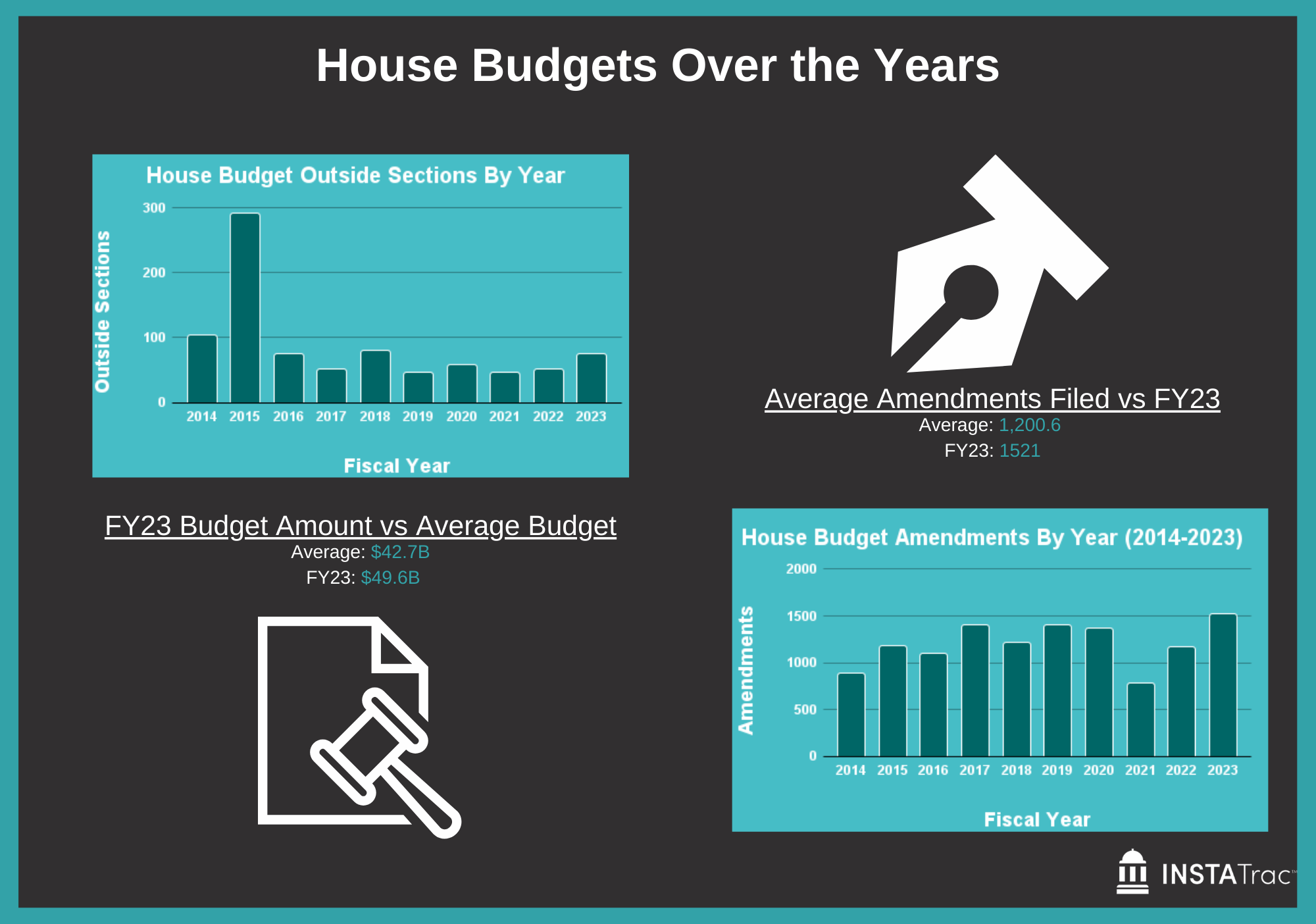
House Budget Breakdown - A Decade in Review
From fiscal year 2014 to fiscal year 2023, there have been many differences between each budget in the Massachusetts House of Representatives. This is in part due to administrative and legislative changes, but also because of the changing needs of the Commonwealth over the past ten years. As debate concluded yesterday evening in the House on the amendments included in the 2023 appropriations act, our data from the last ten years reveals some interesting trends worth noting.

Bring on the Budget Amendments
Last week from 1:00 PM on April 13th to 5:00 PM on April 15th, the Massachusetts House of Representatives released 1,521 amendments to their FY23 (fiscal year 2023) proposed budget (HB4700). In comparison to the House budget for FY22, the proposal in HB4700 had 355 more amendments, marking a 30% increase in the number of filed amendments between 2022 and 2023. This increase in proposed amendments is not atypical of the House of Representatives, but analyzing the budget reveals some interesting trends for FY23 in Massachusetts.

MassTrac: The best way to find and follow amendments
When we think of budgets, we know they’re supposed to be limited to appropriations. But in Massachusetts, we also know that’s not always the case. Budget season has arrived in the Commonwealth - and with it, thousands of amendments will be coming down the pipeline. MassTrac makes it easy to dig through earmarks, outside section changes, and even General and Session Law changes proposed through the budget process.
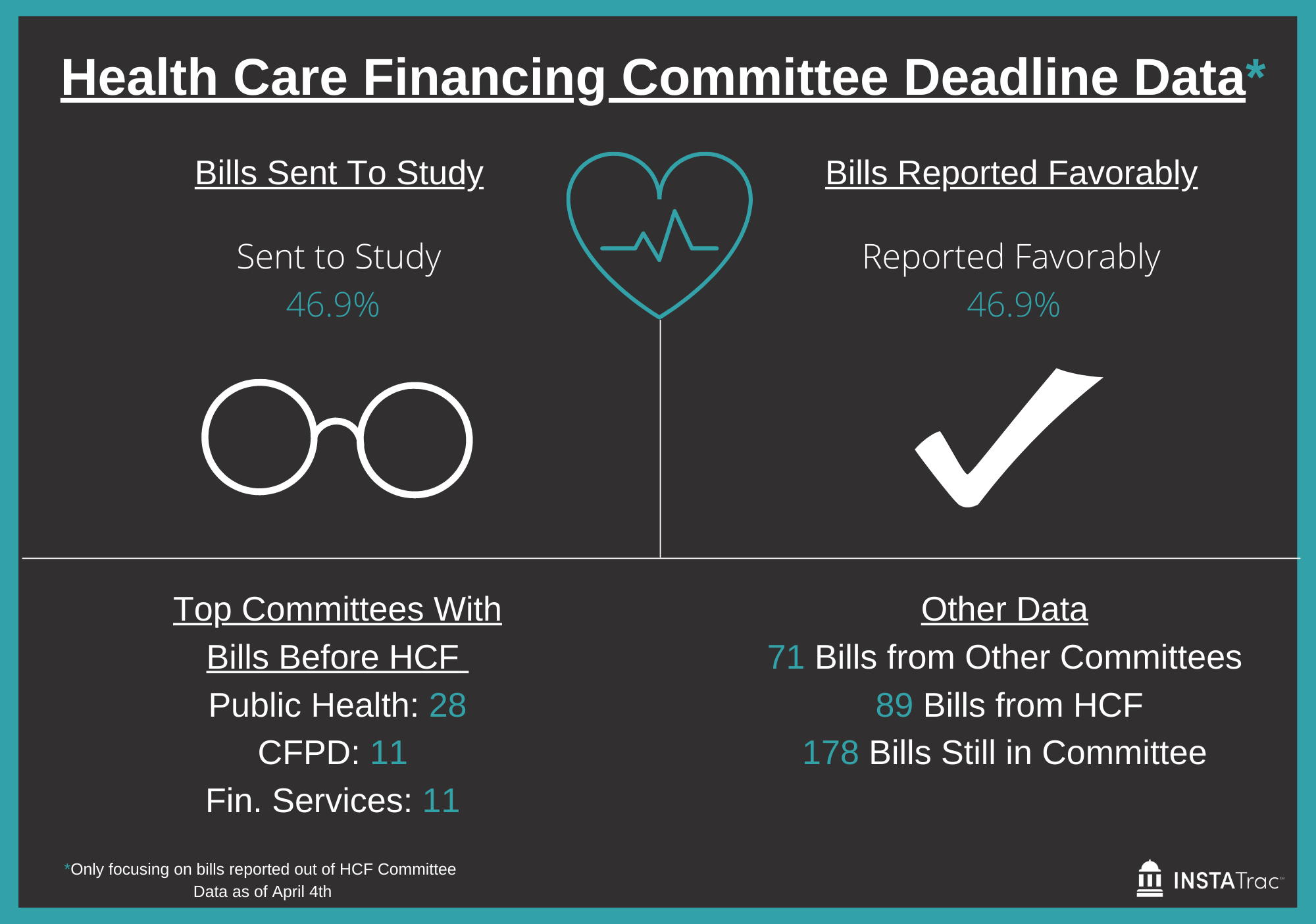
Deadline Data: Joint Committee on Health Care Financing
Each legislative session in Massachusetts includes a deadline for joint committees to report their bills out to the House and Senate floor. For most joint committees, this date was February 2nd of this year. However, one committee differs from the rest: the Joint Committee on Health Care Financing (HCF). Their deadline was last week on March 30th. Our data reveals some interesting trends from this session’s HCF deadline, and how the committee greatly differs from others in the Massachusetts legislature.

Gas Tax Amendment Fuels Senate Debate
By now you have undoubtedly noticed the rising price of gasoline here in the Commonwealth, and in fact, across the US. To help people with this unexpected cost, several states, including Georgia, Maryland and most recently Connecticut instituted a gas tax holiday period. During the month of March, debate over instituting a gas tax holiday period took center stage in Massachusetts, leading to passionate remarks, especially in the Senate.

The Battle for Lt. Governor
Learn more about the three Democratic candidates actively vying for the open lieutenant governor position in this year’s 2022 Massachusetts general election: Senator Adam Hinds, Senator Eric Lesser, and Representative Tami Gouveia.

Massachusetts Committee Transcripts Made Easy: How T2T (Talk-to-Text) Works
Discover how to get accurate, searchable Massachusetts committee transcripts, including committee hearing and floor session transcripts — instantly generated with T2T talk-to-text technology from MassTrac. Learn how searchable transcript text helps you find keywords and moments fast.
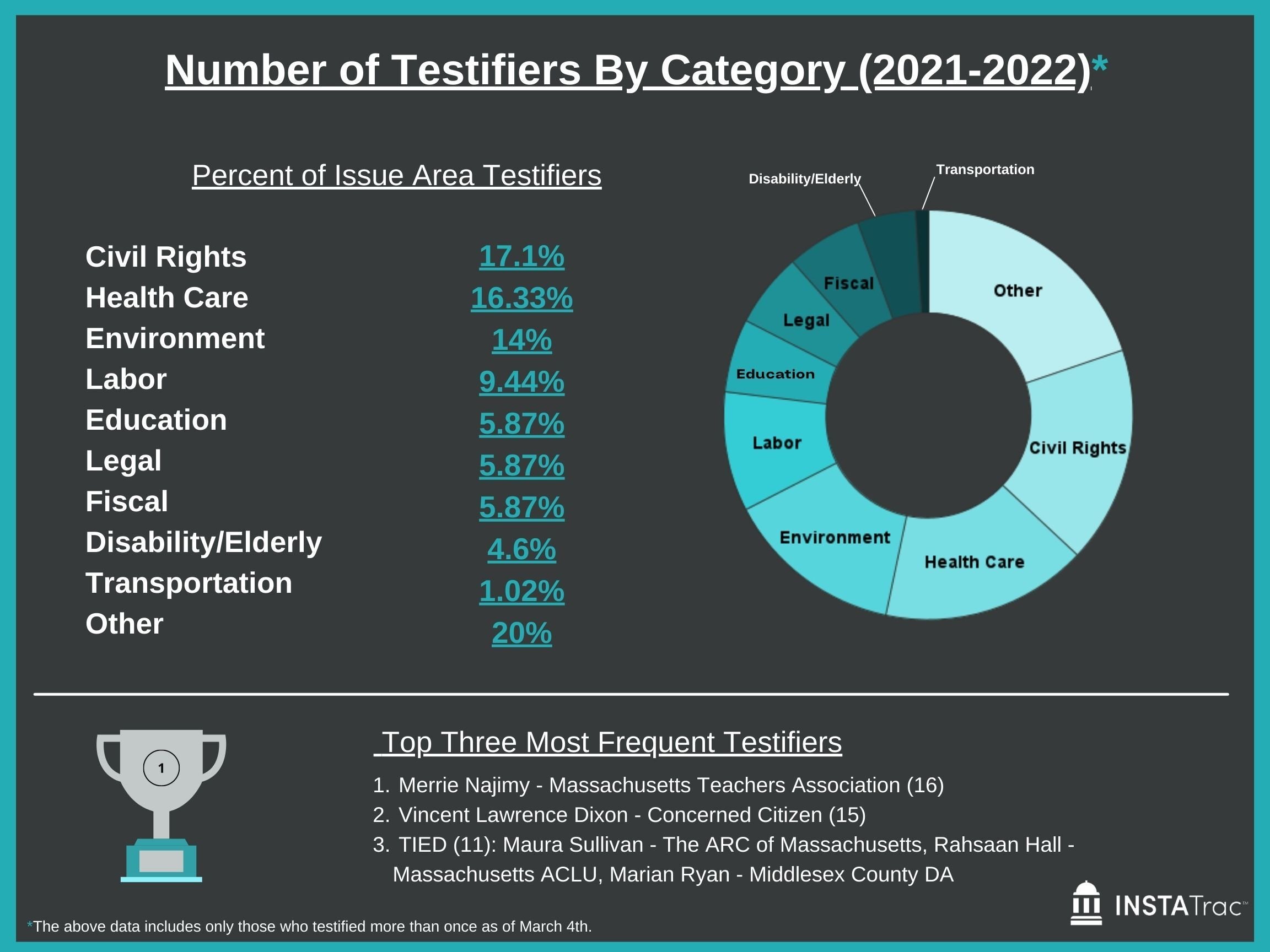
Top Testifiers in Massachusetts 2021-22
In the 2021-22 Massachusetts legislative session, there were over 3,000 people who testified at joint committee hearings. Our analysis found that 494 of these individuals were “frequent” testifiers, meaning that they testified in more than one hearing. This group included various state officials, interest groups, and concerned citizens, all of whom are highlighted in our data.

2nd Suffolk Senate District Matchup
With election season shaping up, it’s a great time to look at one of the hottest races in the General Court. With the departure of Sen. Sonia Chang-Diaz, who is vying for the Governor’s office, there are two active and ambitious representatives looking to move up to the higher chamber.

“Officially” Massachusetts
Ahhh. Massachusetts. So many stereotypes, so little time. While outsiders may associate Massachusetts with its iconic accent or inclement weather, in reality, there are so many other things that make us special. And of course, we want to share them. Click to view this session’s proposed “official” symbols of the Commonwealth.
